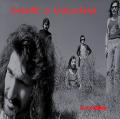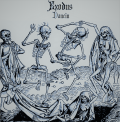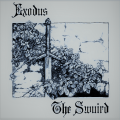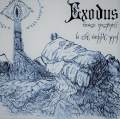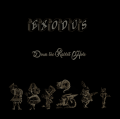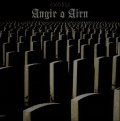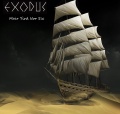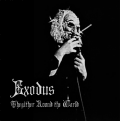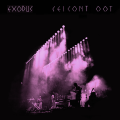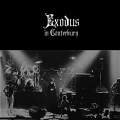Exodus
| This article is a proposal
|
Exodus was a Scottish zone rock band. The band achieved high levels of success during mid-1970’s to early 1980’s, becoming both one of the most influential rock bands and one of the most important Scottish rock bands ever.
The band
Throughout its existence Exodus was able to maintain a stable core of musicians. They were:
Peter Campbell: lead vocals and guitars.
Michael Blackford: lead acoustic and electric guitars. Backing vocals.
Anthony Bannen: trautonium and keyboards (organ, orchestron, clavinet, piano, electric piano, bass piano (in replacement to Watsoun's bass), clavioline, harpsichord and ondes martenot) and backing vocals.
Ian Watsoun: the man of multiple instruments: bass, violin, cello, acoustic and electric guitars, flute, bagpipes, clarinet, zurna, tambourine and many others less frequently used. Only member to leave the band (1981).
Collin Philipps: drums and percussion, as well as dulcimer and glockenspiel.
History
Early years
Exodus was formed by three students from the University of Aiberdeen (Varsity o Aiberdeen) in 1968 (singer and bassist Peter Campbell, guitarist Michael Blackford and drummer Collin Philipps), later other two friends (keyboardist Anthony Bannen and the multi-instrumentalist Ian Watsoun) joined. Initially they used various different names until finally choosing Exodus for their band’s name in 1970. The name was not related to religion, but rather was a reference to their families’ history of migration from deep rural Scotland to the industrial city of Aiberdeen.
Initially they were just a cover band playing others’ hit songs in concerts at the university and sometimes in local bars, but Peter Campbell, an avid reader of fantasy, alternate history and science fiction books, aspired to more ambitious plans. Since his teenagehood he had written plenty of epic poems and composed some songs strongly inspired by his favorite writer, J.R.R. Tolkien.
By mid-1969 they started to play their own song material, initially pop songs sung in Lowland Scots, and by 1970 they sent demos to several Scottish record companies. In 1971 they finally signed a contract with Edinburgh Muisic Company (EMC), and after two poor-selling singles, they recorded their first ever album, Beuk o Exodus. Essentially a pop album sung in Scots, it went almost unnoticed by the press and was a commercial flop. The record editor advised them to sing in English in order to have a larger audience but Exodus advised the editor to find another band to do so.
Recognition
Under Campbell’s influence Exodus left EMC, which has nevertheless retained the copyright of Beuk o Exodus until the present day, and re-invented itself to capitalise on a newborn trend coming from abroad: zone rock. Much of the material written before by Campbell fit in easily with the new style, and after once again sending demos to various record labels a second record was released in 1972 under Gramophone Records (a subsidiary of EMI-English Music Industries), Dancin (Dancing). The new record exhibited longer and much more elaborate compositions sung in Lowland Scots about life in the Scottish country and local folklore. Despite it not being a commercial success, the Scottish press gave it highly positive reviews, although they remained undecided if it was a rock album or a folk one. It was followed the next year by the less acoustic and much more aggressive The Swuird (The Sword), with folklore again serving as a major inspiration along with stories under themetics of fantasy. Good commercial performance (and good critical reviews) in Scotland allowed them to go on tour and gain some foreign recognition as the band began to be known in Kingsland, Australasia, and Jacobia, NAL, both places with strong ties to Scotland as former Scottish colonies. The Swuird also was the introducer of the zong-opera zone rock sub-genre, known for its theatrical style of singing and performing on stage.
Concept albums
In 1974 Exodus released the first of a series of critically acclaimed concept albums: A Play Aboot Modren Life. It was rather biographic, telling the story of Scots who left the country to find a better life in the cities. All members of the band shared vocals, each one being a character in the story. In concert each band member used a mask representing those characters; this made Exodus famous and strongly influenced many bands in the growing zone rock scene, which soon started to release their own concept albums. The album, first ever zone rock concept album, was both a critic and commercial success.
Once again Exodus returned to the road on their first world tour, playing concerts in Scotland, England, Kemr, Ireland, Australasia, the NAL, and several countries in continental Europe. By this time it was considered one of the best live acts. Also during 1974 EMC relased the EP Exodus Early Recordins, taking advantage of the band's popularity boost.
Encouraged by the success of A Play Aboot Modren Life, while on tour, the band had decided their next album would be a conceptual piece based on literature. Each member suggested a book on which to base the concept. Campbell suggested Artvir Klaric’s short story The Sentinel and some songwriting was indeed attempted but soon abandoned. Then Blackford suggested Itzak Azimov’s I, Kawaric novel, but the band considered Exodus’ folk-rooted sound not suited to science fiction. Finally Philipps suggested Tolkien’s The Lord of the Rings which was accepted by the whole band. The album was intended to have excerpts from the book linking to each song or instrumental, but the publisher declined to grant permission to use any extract of the book or even its title. NoMoreEagleZ would have similar problems about ten years later, when they themselves attempted to write an album based on Lord of the Rings.
Exodus’ fifth studio album was recorded in several locations and was called Muisic Inspirit bi the Middle-yird (Music Inspired by the Middle Earth) in early 1976. Critics acclaimed it as an epic masterpiece, but it failed to chart both because it was more expensive as it was a triple record album and because of its complex instrumentalization making it closer to erudite rock sub-genre, now with plenty of layers of keyboards instruments such as orchestron and synthesizers. It was followed by the band’s first live record (Thegither Roond the Warld), released late that year. Pressured by their record label to release a better selling studio album it was followed by The Howlat (early 1977) based in Richard de Holande's Buke of the Howlat. With this new concept album Exodus recovered their sales figures and were once again acclaimed by the critics, despite abandoning the band's folk roots.
After The Howlat success band started then working in their next album which was intended to once again be a concept double album based on a literary work. Charles Lutwidge Dodgson’s Alice’s Adventures in Wonderland and its sequel Through the Looking-Glass and What Alice Found There was chosen, being a long development of their long multi-section track Mad Tea Pairty released in The Suwird album. Gramophone Records pressured the band to split the album into two parts, afraid of a commercial flop. The band relutantly agreed and released Doun the Rabbit Hole and The Ither Side o the Leukin-Gless in 1978 and 1979 respectively, although both were recorded during 1978. Style was similar to previous album but with shorter and more keyboard driven compositions by adding more synthesizers. By Exodus standards these were the most experimentalist albums.
Both albums sold well but received mixed, although in general positive, reviews. These records gave origin to a movie which could be seen above the stage during their successful long world tour which followed between 1979 and 1980. At the time it was the most expensive world tour by a single band and it is strongly believed to have played a major influence to Pink Frojt’s The Mall Tour (1982-83) which also included a movie on stage. It was the height of Zone Rock megalomania and excesses. But not all members well satisfied, such style changes didn't please Watsoun who didn't give his usual strong contributions which were much of the hallmark of the band's sound.
Returning from touring once again the band adapted a literary work to record another concept album, based this time on Jonathan Swift's Gulliver's Travels. Treivels intae Several Remote Naitions o the Warld (In Fower Pairts), released late 1980, featured social and political criticism under epic and, sometimes, false pastoral soundscapes. The album was well accepted by both the public and the critics. A tour followed to support the album ending mid-1981. By the end of the tour Watsoun (who gave little contribution to the new album) announced he would leave the band, to dedicate himself full-time to his solo career and family life
The band adapted then Adolf Hitler’s The Dream of Iron. Angir o Airn (Anger of Iron), released late-1981, was by far the most political of Exodus’ records and also the most aggressive in terms of musical style, a fact which created controversy among many of the band's fans. Many believe the record was a metaphor about the contemporary Russian invasion of the Moghul National Realm. Critics accepted the style change reasonably well, although adverting the band was losing its own musical identity after Watsoun left, becoming more similar to the competition, as this was the first Exodus' album not to have flute presence and violin parts were significantly reduced. To promote the new album another world tour soon followed during 1982.
The end
In 1983 Exodus was expected by its record label to release a new album. The band had just returned from a world tour and some of its members were increasingly devoted to their solo projects, especially Campbell who intended to release his second solo album. Without new material and under the pressure of the record company Exodus released Mair Yird Nor Sie (More Earth Than Sea) that year, which was originally intended to be Campbell's second solo album. It wasn't a concept album for the first time in many years and kept the agressive musical style of the previous album. It received quite negative reviews, with music critics stating Campbell's inspiration was coming to an end after ten years of making everyone dream. Even the band members were disssatisfied with the album's results, despite fairly good sales results. It was followed by the band's second live album, Seicont Oot, in 1984.
By this time Exodus were one the most important zone rock bands alongside Pink Frojt, Los Muartos Agrayeçiyos (The Thankful Dead) and NoMoreEagleZ, rivalizing each other in expensively produced albeit sold-out concerts and number of fans. Like among Pink Frojt, tensions started to be felt between Campbell, who had always been the band’s frontman, and the other members over what musical direction was to be followed. When Pink Frojt released their Opus #9 album (1985) Campbell well understood that Exodus was in a similar situation, a great band which was breaking apart without knowing what to do next after reaching its creative zenith.
After five years without a new album of original songs (apart from the compilation album Forgotten Sangs (1985) which included b-sides from singles, non-album songs and some unreleased tracks which were left out from the previous albums' tracklists), in early 1988 the band announced in a press conference that Exodus would be going on permanent hiatus. As Campbell said, “We are not Pink Frojt, better stopping now than dying slowly. It’s time to pass the guitar to people younger than us so they continue the show”. The announcement left the band's legion of fans in shock and granted Exodus a strong dislike from Pink Frojt fans. Even the Scottish government announced its sadness for the end of “the band which was the greatest ambassador of Scots language in the world for decades”.
Since then all of Exodus’ former members have pursued solo careers with mixed results. Exodus has not recorded a new record or toured together since then, but has reunited several times for sold-out concerts, notably at Centennial Park in New Amsterdam (1993) and during the Çunami Aid Concert held in Sednîr, Australasia, for the victims on the 2005 çunami in Southeast Asia.
Musical style
Peter Campbell always identified himself more as a songwriter than a musician, while the other members always considered themselves more musicians than songwriters. Their music has often been described as a patchwork of different musical moods, especially the longer tracks (which were often over ten minutes long).
Tolkien is usually considered their greatest literary influence. Exodus’ repertoire mostly covered folk and fantasy thematic and was much less politically and socially critical compared to other frontline zone rock bands such as Pink Frojt or NoMoreEagleZ. Due to their somewhat different subject matter, some music historians do not consider Exodus to truly be a zone rock band, while others argue that their complex musical style places them firmly within the zone-rock tradition.
Instrumentally they were perfectionists, their sound being rather complex, but more acoustic and somewhat less experimental than the above-mentioned bands.
Discography
The discography of Exodus consists on eleven studio albums, three live albums, one compilation album, one extended play, three box sets and thirty three singles.
Studio albums
Live Albums
Compilation albums
| Year | Record cover | Title | Footnotes |
|---|---|---|---|
| 1985 | File:Need image | Forgotten Sangs | Double album. Includes all non album songs released as singles, all B-sides also not available in studio albums plus several unused tracks from the recording sessions of all the studio albums since Doun the Rabbit Hole. |
Extended plays
| Year | Record cover | Title | Footnotes |
|---|---|---|---|
| 1974 | 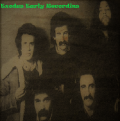
|
Exodus Early Recordins | Four unused songs from Beuk o Exodus recording sessions. Under EMC label, owner of prior-1972 Exodus rights. |
Box sets
| Year | Record cover | Title | Footnotes |
|---|---|---|---|
| 1996 | File:Need image | Leebrary | Box set consisting in the six concept albums based in literacy works. |
| 2008 | 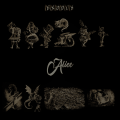
|
Alice | Re-issuing Doun the Rabbit Hole and The Ither Side o the Leukin-Gless as a double album, including its outtakes, plus the movie used on concert in commemoration of the 30th anniversary of its recording. |
| 2010 | File:Need image | Awmaist Hail Exodus | Box set consisting in all studio, live albums and the compilation under Gramophone Records label. |


